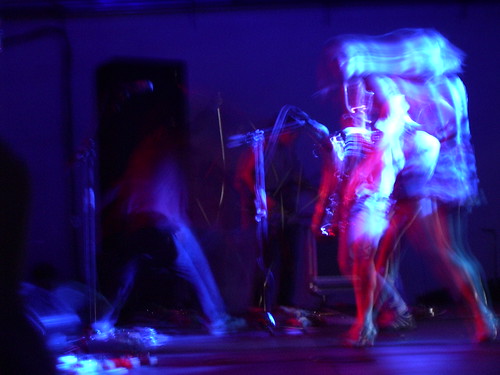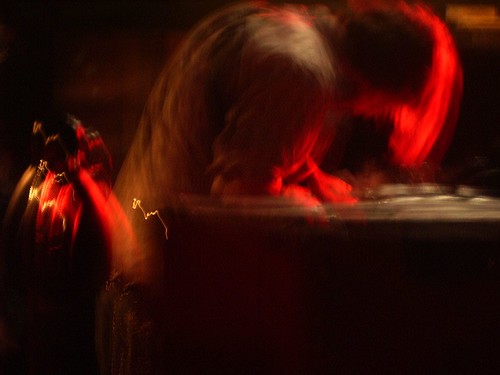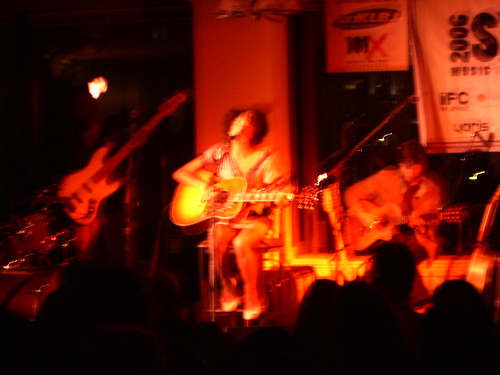A bar in Hoxton, an autumn evening. Outside, diamond drips of freezing rain spot the window, orange streetlamps setting the tarmac aglow, like the streets of London really were paved with gold.
Across several worn leather sofas as crumpled as their slept-in tee-shirts and jeans, the three members of Wives - Californian noiseniks free of mind and mostly empty of pocket - slump with tour-exhaustion like the contents of an upturned suitcase, their faces pale, their eyes dark, their spirits dented but still rallying.
On my left, Randy Randall. Randy sports a patchy beard that only highlights how young and innocent he looks, pale eyes wide open, his ruddy face resembling a young Richard Dreyfuss (circa American Graffiti). Like Dreyfuss, there’s a slightly-insane enthusiasm that revs like a chainsaw in his throat when Randy talks, a growling, gravely buzz of wild ideas and creative freedom, of possibilities. A dude who doesn’t blink before bright light, he opens his eyes wider. On my right, Dean Allen Spunt. Dean’s tired of the story of how an automobile accident with a semi-famous rap-rock star financed Wives’ early recordings, but what the Hell, it’s a good story (and almost true). Amiably laconic flip to his bandmate’s wiry fervour, Dean’s striking and gaunt, like a model might be, or an actor, which Dean sometimes is (catch his lead role in Ben ‘Friends Forever’ Wolfinsohn’s wonderful High School Record, should it ever see the light of screen). He talks with a dry Californian drawl, but his words are as alive with that same irascible creative energy. They make a good pair. Collapsed between them, eyes shaded behind midnight bangs, their drummer. I didn’t catch his name, and he said exactly zilch during the interview. He seemed very, very tired.
Upstairs, in a bare red room, their bruised and busted equipment lay in wait for their show that night. This is Wives’ first European tour. And, as they possibly decided this very evening, their last.
But this isn’t a story about endings. It’s not even a story about beginnings, but rather that ecstatic, chaotic distance between both points, when anything and everything seems possible. But stories need beginnings, and ours begins at The Smell, a communal artspace in Downtown LA, between 2nd and 3rd Street. The only all-ages venue in town, it’s a long brick room with art hanging on one side, and a stage and musical equipment set up on the other. There’s no alcohol for sale but you can always get some vegan food, and shows rarely cost more than $5; the kind of place where kids who turn up to see their first show there walk away inspired enough to book their own show for the following week (and The Smell’s booking policy is flexible enough to facilitate that).
The Smell’s influence on their restlessly, relentlessly inventive music is indelible. They were eighteen when they formed, and numbered Jeremy Villalobos on drums (he left the band last year), while Randy and Dean abused samplers and noise machines.
“It was never our intention to be a ‘guitar-rock’ band,” understates Randy. Asked for influences, he cites “what we wanted to hear; we knew what rock bands sounded like, so the aim was to do something that didn’t sound like that. A new sound...”
“It wasn’t just the music itself, it was the way we wanted to present ourselves,” adds Dean. “Where we live in LA, most of the musicians are kinda ‘rock dudes’. Glamorous Hollywood ‘professional rockers’, or jaded indie-rockers. If we were in a band, we’d fuckin’ jump around and have a fit, instead of standing up there like, ‘I’m being paid, I’m a professional’.”
“We were always the young, excitable kid in a band who wanted to do something different,” continues Randy. “We’d be told, ‘You can’t do that, do what you’re supposed to!’ [laughs]. We’d be like, okay, like good little brothers. Then we thought, fuck that! When we met, we were doing none of that. Because we’d finally met like-minded people. Let’s do that ‘something different’.”
That ‘something different’ began with abstract noise bursts, static electricity painted violently over primal drumbeats. They spent a year in the rehearsal room, experimenting more than practicing, then played that first show at The Smell.
“I think it was a really good show,” laughs Dean. “We played in the centre of the room - which was still unusual then - with the lights off, and headlamps on our heads. People got offended when we played. The Smell is definitely very art-orientated and open-minded, but we were beyond even that… People would say, ‘that’s not art!’ We wanted to make art and have a good time and laugh, and that concept was alien to people. We were, like, we’re gonna do this our way, fuck you for having this ‘old guy’’s attitude. People were taken aback, they thought we were being snotty or whatever, but it was never meant like that.”
A first self-released 7” caught the band sparking and glitching on the avant horizons; a second saw them employing a guitar, though as noise-making device rather than musical instrument. Their debut album, Erect The Youth Problem (recorded at the beginning of 2004) pitched them somewhere to the left of Lightning Bolt, blasting a staunch wreckage of blackened guitar noise at acute counter-points to an ever-evolving, ever-collapsing bustle of drums. This was Black Flag’s Damaged - the Chopped and Screwed version. Of course, it was a noise all it’s own, everything Wives had been aiming for, and had been, for their two years so far: a chaos of barked lyrics as overloaded, disjointed and synapse-jolting as the music itself.
But there’s a sense, perhaps, that this great album was the beginning of Wives’ undoing (because, to spoil the surprise ending, they are now undone); within its coagulation of a previously-liquid, flowing sound, its snapshot of one millisecond of musical evolution, Wives would find themselves trapped, unnaturally static, and at odds with their group’s very essence.
“Once you write a song, you better fuckin’ love it because you’ll be playing it for a while,” observes Randy. “There was no real concept behind the album, it was just a bunch of songs we’d written. It’s funny to still be playing them, two years later.”
“I can guarantee the next record we make won’t sound like this,” adds Dean. “We’ve always considered this an evolving thing. This record’s just one step along the way.”
“I don’t know though,” avers Randy. “The steps take longer now. When we started, it was one week to the next, new songs all the time, each setlist was different. At some point, things started to take longer, so every year there’ll be new songs, then every two years, instead of every week, like we started.”
That sense of time dragging is perhaps what mars the set that follows that night. Or perhaps it’s the broken equipment, the unreliable PA. Or perhaps it’s just the fact that touring the world on a non-existent budget is really fucking exhausting. Whatever, Wives flail valiantly, but their every thrust seems only to tug the plugs from their sockets. Sound cuts out, songs break down… But still, in the impotent chaos, something pure and lustful; moments, like Randy tumbling and twirling into the crowd, guitar jagged and painful, during the brutal stutter of ‘All Dad’s Alike’, matching the desperate venom of the album.
Whatever, another London date weeks later (ending in onstage destruction and clumsy bloodshed) marks Wives’ dissolution. Music - and especially improv music like Wives’ was at its best - is like the shark Woody Allen compared relationships to, it either moves forward or it dies. And perhaps, in this one embrace of how Rock Bands behave - touring, playing songs off the album, standing still long enough for the world to suss out what you are - Wives died.
“We broke up because when its time to move on and leave something behind, you just know,” wrote Dean in an email a couple of weeks later. As an epitaph, it suits Wives perfectly, but for a clue as to why they were so electrifying for their short life, seek out Erect The Youth Problem at your earliest convenience.




No comments:
Post a Comment